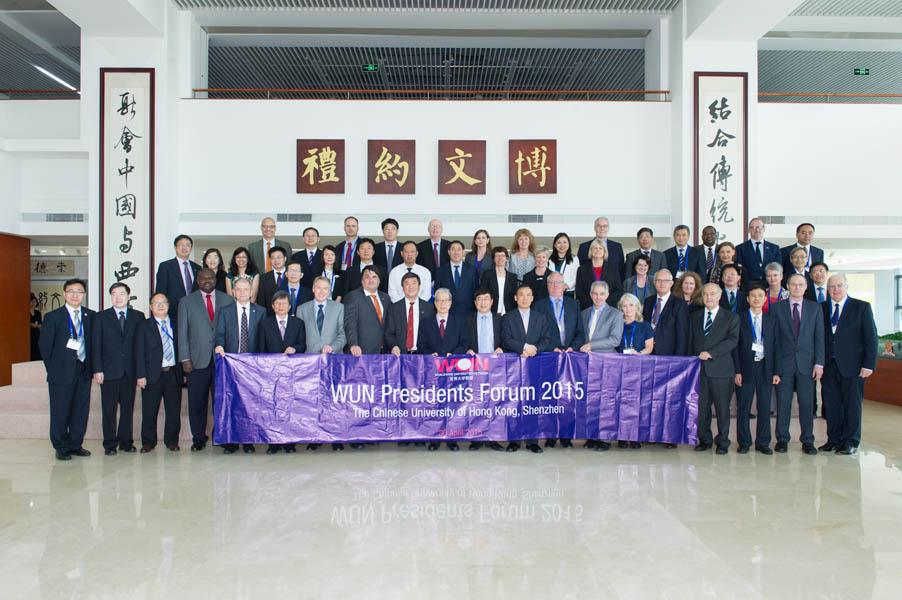
Academic leaders from across WUN and local Chinese universities came together for the fifth annual WUN Presidents Forum at The Chinese University of Hong Kong, Shenzhen on 30 April.
The Presidents Forum, which is part of the annual WUN Conference and AGM, brings together university leaders to exchange their insights on higher education. This year’s forum, titled Global and Local: Reform Agendas for Higher Education in China and the World, facilitated discussion around strategy and policy priorities, as well as potential partnerships in research and education between the participating universities. The forum was co-chaired by Dr Max Price, Chair of the Partnership Board and Vice Chancellor of the University of Cape Town, and Professor Joseph J.Y. Sung, Vice Chancellor of The Chinese University of Hong Kong.
The forum began with a welcome address by Dr Max Price, followed by Professor Xu Yangsheng, President of The Chinese University of Hong Kong, Shenzhen. A keynote speech was then delivered by Professor Yang Fujia, President of the University of Nottingham Ningbo, on his insights into China’s position on higher education reform and opportunities to take part in China’s higher education development.
Following was a panel discussion and open-floor discussion on advancing higher education internationalisation through partnership and collaboration. Senior representatives from WUN universities participated in the discussion, as well as university leaders from across mainland China. Several presidents commented on the state of higher education in their respective regions, the specific challenges they face at their institutions and potential opportunities for collaboration with China.
Provost Newman said the University of Massachusetts (Amherst) is increasingly moving toward ‘density models’ as a result of increased internationalisation in higher education.
“We are now looking to build strategic partnerships that combine the flow of undergraduate students, the exchange of doctoral students, collaborative faculty projects that are sustained and built over time. I think in the future, universities will selectively invest in those more dense ties, which will hopefully be sustained permanently,” said Provost Newman.
A key question asked by Professor Sung during the discussion was about facilitating collaboration among the participating universities.
“As a foreign university, what are the difficulties in terms of coming to China? What sort of obstacles do you face? For Chinese universities, what exactly do you need from these foreign universities? What are the areas that Chinese universities are interested in?” asked Professor Sung.
Vice Chancellor of the University of Bristol, Sir Eric Thomas, identified some of the challenges in terms of collaborating with Chinese universities and how belonging to a network can significantly ease the process.
“An obvious obstacle is the size of the country. Which universities do we work with and why? Would they want Bristol anyway? That comes to the next issue. I have a full-time job back at home leading a university in a very difficult, tense and unpredictable atmosphere at the moment. To be going around the world doing a lot of dancing with a lot of partners takes a significant amount of resources,” said Sir Thomas.
“This is why I find belonging to a network so helpful, because it actually produces a very, very good mechanism of meeting many universities. We have done much work with Zhejiang as a result of being part of WUN.”
WUN Executive Director John Hearn concluded by saying that the half-day discussion was highly successful in raising a number of key issues.
“Here we have presidents from universities on five continents who, in only three hours, have raised a number of key issues. In a sense, it has been like a think tank that has raised issues but has not been able to think through solutions, so we’ve got more work to do as a think tank and as an exploratory team. We will follow up on the discussions to seek practical strategies and actions,” said Professor Hearn.
WUN’s Global China Group is currently exploring potential opportunities for further collaboration with several Chinese universities.
View the Presidents Forum Programme
